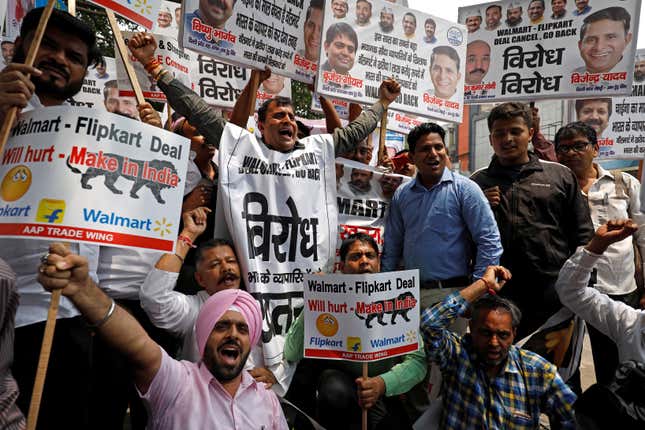It hasn’t even been a year since the world’s largest e-commerce acquisition was announced. And naysayers are already predicting a doom.
On Feb. 05, American investment bank Morgan Stanley reportedly said in a note that Walmart may consider exiting its prized India acquisition, Flipkart. The Bentonville-headquartered retail giant had bought a 77% stake in India’s largest homegrown e-tailer for a massive $16 billion (Rs1 lakh crore) in May 2018.
Citing Amazon’s 2018 decision to exit China after it struggled to meet the local policies, Morgan Stanley said, “an exit is likely not completely out of the question with the Indian e-commerce market becoming more complicated.” It estimates that Flipkart’s losses may widen by 20-25% due to India’s new foreign direct investment (FDI) regulations.
On Feb. 01, the Indian government implemented several restrictive changes to its FDI policy for e-commerce. The new rules bar online marketplaces from entering into exclusive deals for selling products and having a single vendor supply more than 25% of the inventory. The rules also restrain online marketplaces from influencing prices in order to curb deep discounting.
At least three analysts who spoke to Quartz for this story said that Morgan Stanley’s comments are not completely outlandish.
“I don’t know if Walmart is planning to exit Flipkart but it’s within the realm of possibilities,” said Kartik Hosanagar, a professor of technology and digital business at the University of Pennsylvania’s Wharton School. “The new regulations and the timing certainly hurt Amazon and Flipkart and the broader sentiment of global investors…Overall, I am afraid that this was not well implemented. It hurts the two large players and presents government interference and regulation as a potential risk for global investors.”
The speed bumps
This is not the first setback that Walmart has faced after its acquisition of Flipkart.
Just days after the acquisition was announced, it faced a severe backlash from small traders in India who saw Walmart’s entry into the country as a threat to their businesses. Several prominent industry associations, including the Confederation of All India Traders (CAIT), which represents over 70 million small traders, filed an anti-trust petition with the Competition Commission of India (CCI) over the deal.
In August last year, the CCI approved the deal. However, CAIT had threatened to challenge the competition watchdog’s decision in court.

While traders’ opposition has not had much impact, Walmart has seen other implications of the deal.
In October last year, the American retailer said that the impact of the Flipkart acquisition on its finances may be worse than it had earlier estimated. The company had lowered the outlook for its adjusted earnings per share (EPS) in fiscal 2019 from $4.90 to $5.05 earlier, to $4.65 to $4.80.
And now the new clauses to India’s e-commerce FDI policy are almost like a nightmare come true for Walmart.
“If the government is merely providing clarifications regarding how best to interpret existing regulations (as has been claimed), it is a bit late. Amazon and Flipkart/Walmart have already established a business model and have been functioning with that model for years now. Such a clarification should have been issued years ago when those business models were still being formed,” Hosanagar said. “At this stage in India’s e-commerce market, radical reinterpretation is not ideal.”
The policy prick
Morgan Stanley is not alone in ringing the alarm bell about India’s new e-commerce FDI norms.
The policy could lead to online sales in India falling by $46 billion by 2022, consulting firm PwC had estimated earlier this month in its draft analysis. Media reports have said that both Amazon and Flipkart have seen nearly a third of their sales volume disappear since Feb. 01.
Already, Amazon.in is estimated to have removed around 400,000 products from its website, and shut down its grocery delivery service, Pantry. Flipkart is also estimated to have removed a quarter of the products listed on its portal to meet the new regulations.
What’s worse is that the new policy favours domestic ventures as the curbs are only levied on companies that have received FDI.
“The new regulations are semi-protectionist and will directly benefit local players such as (India’s richest person) Mukesh Ambani’s Reliance Retail. Who all have been pulling the strings within the government to make this happen is anybody’s guess,” Anindya Ghose, the Heinz Riehl professor of business at New York University (NYU), told Quartz. “Walmart and Amazon will feel more than a pinch. It is not a big stretch of imagination to understand why Walmart may want to back out of the Flipkart deal.”
However, Flipkart is not an acquisition that Walmart can just walk away from overnight.
The (other) argument
India’s new rules have made running an e-commerce venture in the country difficult. Under such circumstances, even if Walmart was to look for an exit, it won’t find any investor willing to pay back even the amount that has already been invested in Flipkart, a Mumbai-based investment banker told Quartz, requesting anonymity.
“The only reason Walmart would consider selling its Flipkart share within such a short timeframe is if it was getting a hefty premium on its investment. Given the new e-commerce laws, Flipkart is worth much less than what Walmart spent on it. So it makes absolutely no businesses sense for Walmart to lose billions of dollars only because a policy has been changed.”
Besides, Walmart has in the past faced policy-related troubles in other countries, including in China, but has not quit on those markets.
Following the remark from Morgan Stanley, Flipkart CEO Kalyan Krishnamurthy sought to calm nerves by writing to the company’s employees.
“The report couldn’t be further than the truth. Walmart remains extremely confident about the potential of the Indian market and in Flipkart’s ability to lead the e-commerce space,” Krishnamurthy’s email reportedly said. “By partnering with Flipkart, Walmart has taken a long term view of the opportunities and hence is unfazed with any short-term hurdles.”
Charles Fishman, an American journalist who has closely observed Walmart for over 15 years and written a bestseller, The Wal-Mart Effect: How The World’s Largest Retailer Really Works, agrees with Krishnamurthy.
“Walmart knew exactly what they were buying, and in what country they were buying it. Flipkart is a long-term bet on the future of India, Indian business and the Indian consumer market,” Fishman told Quartz over email. “It’s not how Walmart wanted to start off this first year of Indian e-commerce business. But it comes with the territory of being an international company and having to expect things to not always go smoothly. Walmart bought Flipkart, not for what would happen in 2019, but what will have happened by 2029.”
The Walmart effect
Walmart has burnt its hands in India earlier. In 2007, the American retailer entered into a joint venture with the Indian conglomerate Bharti Enterprises to create Bharti-Walmart. However, the venture failed to pick up. In 2009, Bharti-Walmart’s first store came up in the northern India city of Amritsar, and over the next eight years, Walmart added only some 20 more stores here.
But the Flipkart investment is not the same.
“Walmart’s earlier efforts in business in India were, for one thing, relatively small. There wasn’t much investment at risk, just the future business Walmart really wanted to develop,” Fishman said. “There is no chance Walmart will leave India, or attempt to divest itself from Flipkart, quickly. Remember: Walmart spent an entire year’s profit—$16 billion—to buy Flipkart.”
Fishman also points to the fact that the rules have changed for everyone, and not Flipkart alone. “If everyone is playing by the same rules, Walmart is typically confident it can do that smarter, faster, more efficiently—be as good or better within the framework everyone is playing in.”
Ananya Bhattacharya contributed to this story.
